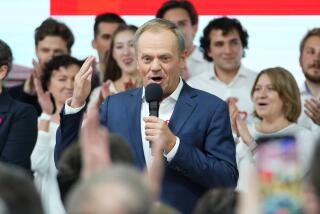International Business : 1995 Could Be Breakthrough Year for Polish Economic Reforms : Outlook: Country must maintain financial discipline and adapt quickly to European Union standards, experts say.
- Share via
WARSAW — Poland could make 1995 a breakthrough year for its economic reforms after several major successes this year, including a crucial deal with commercial lenders and a surge in industrial output, economists say.
They agreed that despite a volatile political scene, which often creates a false impression of reforms being in danger, Poland has stayed firmly on track toward a market economy and integration with Western Europe.
“Poland is entering 1995 with very strong momentum, and the task will be to capitalize on this by maintaining financial discipline and pressing ahead with reforms,” Marcus Rodlauer, the International Monetary Fund’s representative in Warsaw, said in an interview.
According to preliminary estimates, Polish output will rise about 12% this year thanks to an estimated 20% increase in exports and 7% growth in investment.
“Industrial output may rise this year by over 12%--a European record, comparable only to China,” said Tadeusz Chroscicki, head analyst at the Polish planning ministry.
Independent economists believe production is going to keep growing rapidly next year, probably producing 5% growth in gross domestic product--the same as this year.
The economy is also likely to get a boost from commercial debt negotiations in which Poland won a write-off of almost 50% from banks on a $13-billion debt.
Warsaw is about to resume commercial debt servicing after two decades of being in default, and the September deal paved the way for its first Eurobond issue, planned for early 1995.
J.P. Morgan & Co. won a tough contest among 19 major international banks to lead the first $200-million issue.
Economists agree that this and next year’s growth are being helped by radical reforms undertaken by non-communist governments since 1989, as well as world recovery and disciplined financial policies by the current left-wing government.
But the government needs to push ahead with long-delayed unpopular moves to ensure growth beyond 1995, economists say.
Poland must also start adapting quickly to European Union standards if it wants to become a member at the turn of the century, they say. The adjustments involve not only enacting laws compatible to EU regulations, but bringing down inflation, selling off the bulk of state firms and reforming the communist-era social security net.
December’s inflation is expected to fall to about 28% from 38% last year; it is expected to drop to 17% next December.
The pace of privatization is flagging because of government reluctance and a lack of foreign and domestic capital capable of absorbing the 5,000 firms still in the state’s hands.
Foreign investment is likely to flow faster thanks to the debt deal, but critics stress that government must create a more competitive environment for large state industries, which it often seems reluctant to let out of its hands.
“Poland will not succeed if the state keeps deciding which companies to merge, which to divide. We see this as an attempt to build state capitalism,” said Jan Szomburg, an expert at the Gdansk Research Institute for Market Economy.
More to Read
Inside the business of entertainment
The Wide Shot brings you news, analysis and insights on everything from streaming wars to production — and what it all means for the future.
You may occasionally receive promotional content from the Los Angeles Times.










